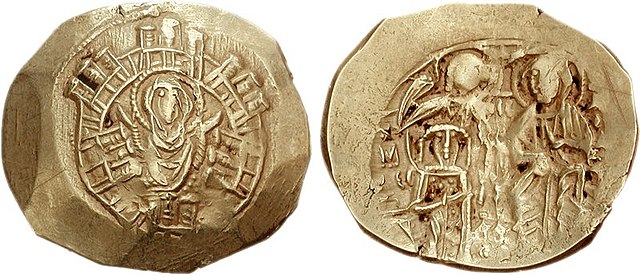Byzantine–Venetian treaty of 1277
The Byzantine–Venetian treaty of 1277 was an agreement between the Byzantine Empire and the Republic of Venice that renegotiated and extended for two years the previous 1268 treaty between the two powers. The agreement was beneficial for both sides: Byzantine emperor Michael VIII Palaiologos kept the Venetians and their fleet from participating in the attempts of Charles of Anjou to organize an anti-Byzantine crusade, while the Venetians were able to retain their access to the Byzantine market, and even augment their trading privileges by gaining direct access to the Black Sea and the right to their own quarters in Constantinople and Thessalonica. Furthermore, they were able to stop the Byzantine reconquest of Venetian-aligned territories in the Aegean, although the treaty explicitly allowed both sides to continue fighting for control of the island of Euboea (Negroponte). Nevertheless, the agreement's short duration made clear that for both parties, it was a temporary expedient. After the treaty expired, the Venetians allied with Charles of Anjou, but their plans were thwarted by the outbreak of the War of the Sicilian Vespers in 1282, forcing Venice once more to renew the peace with the Byzantines in 1285.

Emperor Michael VIII Palaiologos (14th-century miniature from George Pachymeres' History).
Portrait of Doge Jacopo Contarini, from the Storia dei Dogi di Venezia, 1867
Hyperpyron of Michael VIII Palaiologos
Byzantine–Venetian treaty of 1268
In 1268, the Byzantine Empire and the Republic of Venice agreed to temporarily end hostilities which had erupted after the Byzantine recovery of Constantinople by Emperor Michael VIII Palaiologos in 1261.
The restored Byzantine Empire of Michael VIII Palaiologos, and its neighbours, in 1265 (William R. Shepherd, Historical Atlas, 1911)
Emperor Michael VIII Palaiologos (14th-century miniature from George Pachymeres' History).
Hyperpyron of Michael VIII Palaiologos




